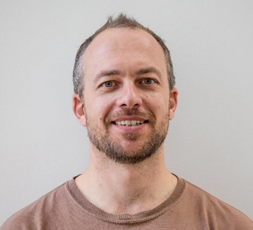Meet Our New Research, Innovation & Improvement Lead
Mark Griffiths started in this new role for Public Health Wales working closely with our Director Dr John Boulton just as the Covid-19 Lockdown began. Here he shares his insights on the impact of the pandemic and what this means for research, innovation and improvement across health and social care in Wales.

Now, perhaps more than ever, Covid-19 has brought to the forefront of everyone’s attention the vital role of the NHS and social care; both its greatness and its vulnerabilities. Governments have been mindful of this, probably for the entire 70 plus year history of the institution. The Parliamentary Review of Health and Social Care in Wales outlined a number of recommendations on how to confront some of those ever-present challenges and support change across the health and social care sectors in the years ahead. One key recommendation being to increase the value from funding of health and care through improvement, innovation, use of best practice, and eliminating waste. In essence, improving productivity and efficiency, and minimising unwarranted variation.
The Welsh Government’s response was to publish their plan for health and social care in ‘A Healthier Wales’. One action was to establish a nationally co-ordinated network of hubs that bring together research, innovation and improvement activity within each Regional Partnership Board footprint. To coordinate this ambition and provide contact points for regional hubs, national Research, Innovation and Improvement Leads have been appointed in Public Health Wales, Velindre Cancer Centre and in the Welsh Ambulance Service.
What difference will it make?
Having fully taken up the role from April, I am starting to develop partnerships with the seven research, innovation and improvement hubs, industry partners and other established local and national organisations. The aim is to support our staff in Public Health Wales, and indeed the entire population of Wales, with the wider adoption of some of the most promising health practices that address the most pressing public health priorities. In some small way, similar to the upscaling of the Tredegar Workmen’s Medical Aid Society, a scheme that helped inspire the creation of the NHS.
When it comes to delivering improvements and being innovative, there is no end of possibilities. From low tech (or no tech) randomised coffee trials, which bring people together who might not ordinarily have reason to speak to each other, right up to whole genome sequencing, and everything in between. My role has the potential to reduce national variation, and help coordinate the adoption of some of the best regional health and care practices. There will also be challenges. Taking an intervention or new idea that works in one location and expecting the same to happen elsewhere isn’t automatically a given. For a new way of working to be adopted and scaled up, it may at first need adapting to fit the local context.
The Covid curve ball
Of course, all of this is happening in the Covid-climate, which has completely changed the landscape and presented a number of challenges. Has this spoiled our plans? No. Rather than innovation being disrupted, we should strive to find opportunities for disruptive innovation to stir up the natural order as we rethink our priorities. It is certainly true that the pandemic has forced us to get creative when it comes to how we communicate. Thanks to the digital age we have plenty of options to stay connected (perhaps too many) through cloud-based online video conferencing tools like Zoom, Microsoft Teams, Skype and Google Meet. In this fourth age of information technology, we have seen the rise of online GP consultations, and platforms such as Proximie offering Avatar-like augmented reality for surgeons to ‘virtually scrub up’ and assist with surgery anywhere in the world. Prior to Covid these innovations were talked about but inertia stifled progress. Covid has forced the system to change and the progress has been remarkable. Disruption has concentrated thinking like never before. From non-health industries adapting 3D printing to make protective visors, to universities re-purposing diagnostic tests to confirm a Covid-19 infection. The list goes on…
Therefore, it is important to see the opportunities. H.G. Wells wrote in The War of the Worlds, “By the toll of a billion deaths man has bought his birthright of the earth, and it is his against all comers.” Life goes on. We can all help shape the future of health and social care through the application of research, innovation and service improvement. It begins with sharing problems, showcasing best practices and learning from others. To this end, I want to hear your ideas on how research, innovations and improvement can help shape and change the future of health and social care in Wales. Do you have an innovation or intervention that you think others can benefit from? If so, I can help in sharing these ideas and supporting their wider adoption. Do you have an unmet need that you think others are also grappling with, or perhaps have successfully overcome? I can work with colleagues across the Hubs to identify solutions to problems that we can share with pride.
Working together, we can scale up some of the great innovations and opportunities for service improvement so more people can benefit. I would love to hear about your ideas or unmet needs. You can email me mark.griffiths5@wales.nhs.uk or phone me on 07342083019.

